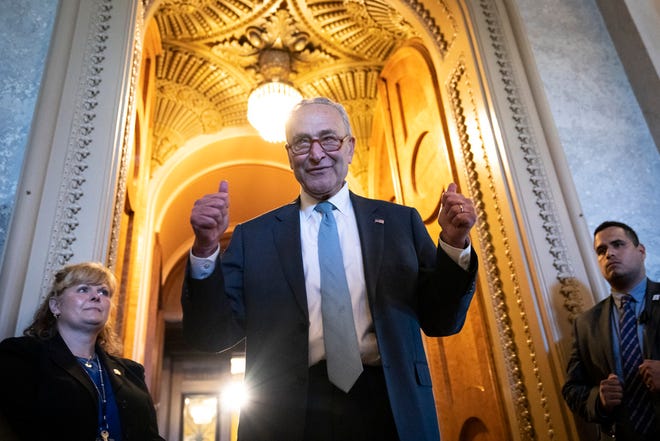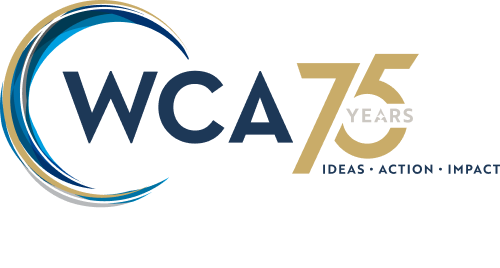The newly passed federal Inflation Reduction Act, also known as the Climate, Health, and Tax Bill, brings to an end to decades of national legislative inaction on climate change. This new law will bolster New York’s efforts to aggressively reduce carbon emissions under the State’s own landmark 2019 Climate Act. Some in the business community have been slow to embrace the pathway to a clean energy economy. They view New York’s ambitious roadmap — the goals and timetables for reducing greenhouse gas emissions outlined by New York’s Climate Action Council draft scoping plan — as impractical, unrealistic and threatening to the state’s economic future. However, indictments of the Climate Council’s work coupled with calls to amend the underlying state statute are short-sighted and misdirected. The fact is, we either face the economic realities of climate change and seek to address them head-on or we pay an even greater price in the long run.

Senate Majority Leader Chuck Schumer, D-N.Y., gives the thumbs up as he leaves the Senate Chamber after passage of the Inflation Reduction Act at the U.S. Capitol Agust 7, 2022 in Washington D.C. Drew Angerer, Getty Images
New York’s Climate Council envisions a zero emissions economy — one where electricity produced by renewables powers our cars and trucks, heats and cools our homes and buildings and runs our factories. There is reason for optimism. Over the past couple of decades, technical, managerial and systems engineering advancement has taken utility-scale renewable electrification, once a far-fetched and prohibitively expensive endeavor, into the mainstream. You can draw a straight line from the billions of dollars of government subsidies for clean energy technology since 2009 to a precipitous drop in the cost of wind and solar energy production — by some estimates almost 90% for solar and 70% for wind — not to mention the widespread adoption of electric vehicles. Numerous European utilities, outpacing the United States on innovation, already have run completely on renewables for short periods of time. Even California’s much maligned energy grid has briefly run close to entirely on wind and solar. In New York, more than 90% of the electricity used upstate is carbon free.
The path for New York is neither cheap nor easy. It will require hundreds of billions of dollars in new infrastructure and incentives. While there are some publicly sponsored financing mechanisms now available, these programs are not sufficiently scaled and will need to be ramped exponentially. In addition to revolving loan funds, we will need tax mechanisms like New York City’s Property Assessed Clean Energy Program on a statewide level. The state will also need to prioritize massive spending in programs such as NYSERDA’s Clean Heat and Flexible Technical Assistance Programs. However, the Climate Council’s plan forecasts a net benefit to the state of between $90 to $120 billion that will expand job opportunities ten-fold. Meanwhile, the long-term economic damages of inaction include higher costs for energy, insurance, borrowing, development and labor. Social costs include increased crime, human mortality and a widening income gap between the wealthy and the poor. Scholars estimate stunted economic growth and a roughly 0.7% decline in GDP on a local scale compounded for every 1 degree increase in average temperature.
Big changes are coming. New York’s climate laws will have a profound impact on day-to-day business operations, transportation, housing and development. Ultimately, only technological advancements, led by the private sector with the assistance of government subsidies and coupled with decreasing energy demand, can push us forward. It is time, therefore, for businesses to embrace sustainable practices. And it is leadership institutions such as the Westchester County Association that will play a vital role in connecting companies to the financial, legal and technological resources they will need to make progress. The WCA is hosting symposiums, convening working groups and advocating for the needs of business around the issues of energy and sustainability. Moreover, the WCA’s award-winning Clean Energy Portal links New York’s businesses to available clean energy programs and incentives.
Given adequate government inducements, the markets will drive our clean energy future. And even assuming we don’t get all the way there, falling slightly short of the mark is neither a defeat nor an excuse for preserving the status quo. We need to act.

Michael N. Romita of Harrison is the new president and CEO of the Westchester County Association. Romita, photographed March 2, 2020, is a former oil executive and trial attorney with the U.S. Justice Department. Seth Harrison/The Journal News
Michael N. Romita is President and CEO of the Westchester County Association. He is an environmental lawyer and former energy company executive.
Click here to view the article on lohud.

